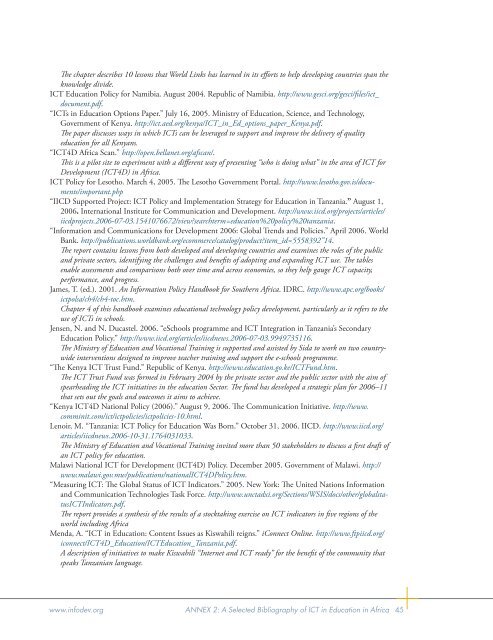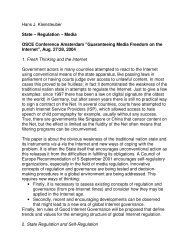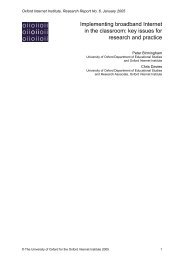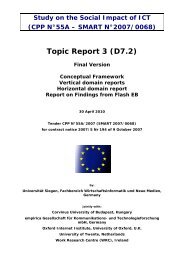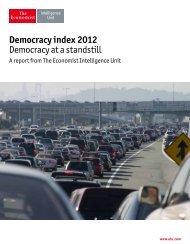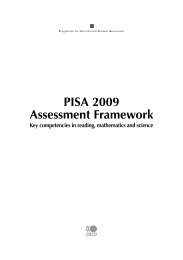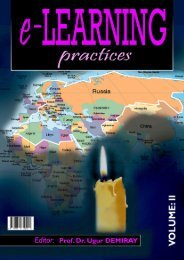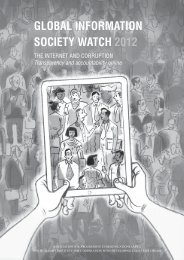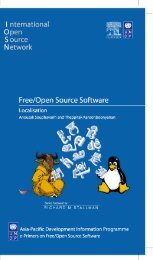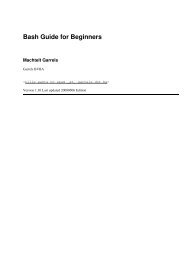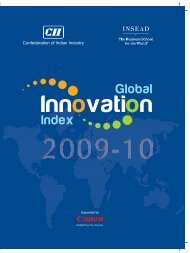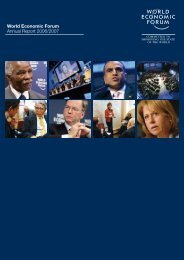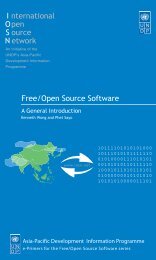The chapter describes 10 lessons that World Links has learned in its efforts to help developing countries span theknowledge divide.<strong>ICT</strong> Education Policy for Namibia. August 2004. Republic of Namibia. http://www.gesci.org/gesci/files/ict_document.pdf.“<strong>ICT</strong>s in Education Options Paper.” July 16, 2005. Ministry of Education, Science, and Technology,Government of Kenya. http://ict.aed.org/kenya/<strong>ICT</strong>_in_Ed_options_paper_Kenya.pdf.The paper discusses ways in which <strong>ICT</strong>s can be leveraged to support and improve the delivery of qualityeducation for all Kenyans.“<strong>ICT</strong>4D Africa Scan.” http://open.bellanet.org/afscan/.This is a pilot site to experiment with a different way of presenting “who is doing what” in the area of <strong>ICT</strong> forDevelopment (<strong>ICT</strong>4D) in Africa.<strong>ICT</strong> Policy for Lesotho. March 4, 2005. The Lesotho Government Portal. http://www.lesotho.gov.is/documents/important.php“IICD Supported Project: <strong>ICT</strong> Policy and Implementation Strategy for Education in Tanzania.” August 1,2006. International Institute for Communication and Development. http://www.iicd.org/projects/articles/iicdprojects.2006-07-03.1541076672/view?searchterm=education%20policy%20tanzania.“Information and Communications for Development 2006: Global Trends and Policies.” April 2006. WorldBank. http://publications.worldbank.org/ecommerce/catalog/product?item_id=5558392”14.The report contains lessons from both developed and developing countries and examines the roles of the publicand private sectors, identifying the challenges and benefits of adopting and expanding <strong>ICT</strong> use. The tablesenable assessments and comparisons both over time and across economies, so they help gauge <strong>ICT</strong> capacity,performance, and progress.James, T. (ed.). 2001. An Information Policy Handbook for Southern Africa. IDRC. http://www.apc.org/books/ictpolsa/ch4/ch4-toc.htm.Chapter 4 of this handbook examines educational technology policy development, particularly as it refers to theuse of <strong>ICT</strong>s in schools.Jensen, N. and N. Ducastel. 2006. “eSchools programme and <strong>ICT</strong> Integration in Tanzania’s SecondaryEducation Policy.” http://www.iicd.org/articles/iicdnews.2006-07-03.9949735116.The Ministry of Education and Vocational Training is supported and assisted by Sida to work on two countrywideinterventions designed to improve teacher training and support the e-schools programme.“The Kenya <strong>ICT</strong> Trust Fund.” Republic of Kenya. http://www.education.go.ke/<strong>ICT</strong>Fund.htm.The <strong>ICT</strong> Trust Fund was formed in February 2004 by the private sector and the public sector with the aim ofspearheading the <strong>ICT</strong> initiatives in the education Sector. The fund has developed a strategic plan for 2006–11that sets out the goals and outcomes it aims to achieve.“Kenya <strong>ICT</strong>4D National Policy (2006).” August 9, 2006. The Communication Initiative. http://www.comminit.com/ict/ictpolicies/ictpolicies-10.html.Lenoir, M. “Tanzania: <strong>ICT</strong> Policy for Education Was Born.” October 31, 2006. IICD. http://www.iicd.org/articles/iicdnews.2006-10-31.1764031033.The Ministry of Education and Vocational Training invited more than 50 stakeholders to discuss a first draft ofan <strong>ICT</strong> policy for education.Malawi National <strong>ICT</strong> for Development (<strong>ICT</strong>4D) Policy. December 2005. Government of Malawi. http://www.malawi.gov.mw/publications/national<strong>ICT</strong>4DPolicy.htm.“Measuring <strong>ICT</strong>: The Global Status of <strong>ICT</strong> Indicators.” 2005. New York: The United Nations Informationand Communication Technologies Task Force. http://www.unctadxi.org/Sections/WSIS/docs/other/globalstatus<strong>ICT</strong>Indicators.pdf.The report provides a synthesis of the results of a stocktaking exercise on <strong>ICT</strong> indicators in five regions of theworld including AfricaMenda, A. “<strong>ICT</strong> in Education: Content Issues as Kiswahili reigns.” iConnect Online. http://www.ftpiicd.org/iconnect/<strong>ICT</strong>4D_Education/<strong>ICT</strong>Education_Tanzania.pdf.A description of initiatives to make Kiswahili “Internet and <strong>ICT</strong> ready” for the benefit of the community thatspeaks Tanzanian language.www.infodev.org ANNEX 2: A Selected Bibliography of <strong>ICT</strong> in Education in Africa 45
“Mozambique <strong>ICT</strong>4D National Policy. 2000.” July 19, 2006. The Communication Initiative. http://www.comminit.com/ict/ictpolicies/ictpolicies-12.html“The Namibian <strong>ICT</strong> Policy for Education”. 2005. The Communication Initiative. http://www.comminit.com/trends/ictpolicies/ictpolicies-22.html.National Information and Communications Technology Policy. January 2006. Ministry of Information andCommunications, Republic of Kenya. http://www.information.go.ke/policy/<strong>ICT</strong>%20Policy.doc“New Virtual Reality-based Learning Approach in Africa.” June 20, 2006. UNESCO. http://portal.unesco.org/ci/en/ev.php-URL_ID=22398&URL_DO=DO_PR<strong>IN</strong>TPAGE&URL_SECTION=201.html.A recent UNESCO-funded workshop held in Pretoria looked at the creation of VR-based applications in theAfrican learning context with a focus on the localisation of interactive3-D learning objects to suit and addresslocal needs.“Online Education: What Can It Deliver?” e-Learning Africa, News Portal. http://www.elearning-africa.com/newsportal/english/news8.php.The Development Gateway has posted a special report that looks at lessons learned, innovations that work, andthe future of <strong>ICT</strong>s in education for developing countries.Reduction Strategy (GPRSII) (2006 Republic of Ghana Growth and Poverty—2009). November 2005.National Development Planning Commission, Republic of Ghana. http://www.ndpc.gov.gh/pdf/Final%20GPRS%20II%202006.pdf.The strategy is intended to introduce a shift of strategic focus between 2006 and 2009 to accelerate the growthof the economy. Specifically the policy addresses issues pertaining to the development and delivery of education,access to different levels of the education ladder, <strong>ICT</strong>, distance education, professional development, and themanagement and financing of education.Souter, D. et al. “The Economic Impact of Telecommunications on and Rural Livelihoods and PovertyReduction.” June 2005. DfID.The research reported in this document assesses the impact of the telephone on the lives of the rural poor in threedeveloping countries—in the state of Gujarat in India, in Mozambique, and in Tanzani . http ://www.telafrica.org/R8347/files/pdfs/FinalReport.pdfTrucano, M. “<strong>ICT</strong> and Education Activities Supported by USAID.” November 13, 2006. InfoDev, WorldBank. http://www.infodev.org/en/Publication.142.html.A quick guide to <strong>ICT</strong> and education activities supported by USAID.Trucano, M. “Quick guides to resources and work on <strong>ICT</strong>s and education in international institutions anddonor agencies.” November 13, 2006. InfoDev, World Bank. http://www.infodev.org/en/Publication.141.html.A quick guide to <strong>ICT</strong> and education activities supported by the World Bank, UNESCO, Dfid and otherinternational development institutions..Trucano, Michael. “Knowledge Maps: <strong>ICT</strong>s in Education”. 2005. <strong>infoDev</strong> / World Bank. http://www.infodev.org/en/Publication.8.htmlSummarizes what we know—and what we don’t -- about the effective uses of information and communicationtechnologies in education in developing countries, with a particular attention to Africa. .Wagner, Daniel A., Bob Day, Tina James, Robert B. Kozma, Jonathan Miller and Tim Unwin. “Monitoringand Evaluation of <strong>ICT</strong> in Education Projects: A Handbook for Developing Countries”. 2005. <strong>infoDev</strong> /World Bank.This short handbook provides guidance for policymakers struggling with two key issues especially relevant to theAfrica context: What is the impact on student achievement of introducing <strong>ICT</strong>s in educational settings indeveloping countries? How should this impact be measured, and what are the related issues, especially as theyrelate to Education For All and other Millennium Development Goals?. http://www.infodev.org/en/Publication.9.html2. <strong>ICT</strong> Infrastructure“African Ministers to Sign Fibre Project Protocol.” August 2006. The i4d (Information For Development)print magazine. http://i4donline.net/news/news-details.asp?catid=7&newsid=5266.46Survey of <strong>ICT</strong> and Education in Africa: A Summary Report Based on 53 Country Surveys
- Page 1:
+ MAINSTREAMING ICT and Education S
- Page 5 and 6:
Infrastructure in Schools 11Infrast
- Page 7 and 8: larger, on-going, systematic, coord
- Page 10 and 11: Project BackgroundOverviewThis repo
- Page 12: Mary Mmayi, Philip Ouma Ayoo; Dlang
- Page 16 and 17: DANTE (Delivery of Advanced Network
- Page 21 and 22: nnnnand South Africa, have mechanis
- Page 23 and 24: countries. In addition, a very limi
- Page 25 and 26: nMauritius uses a fleet of “cyber
- Page 27 and 28: nnnnnnInstitutional policy developm
- Page 30 and 31: ICT Activities and Initiativesin Pr
- Page 32 and 33: nnnnnnsourced second-hand and refur
- Page 34 and 35: use of ICTs in teaching and learnin
- Page 36 and 37: ICT Activities and Initiativesin No
- Page 38 and 39: Gender Equity and ICTin EducationGe
- Page 40 and 41: Factors Enabling andCONSTRAINING IC
- Page 42 and 43: ICT in Education inAFRICA: A Way Fo
- Page 44 and 45: Notes1. Steiner, R., T. Nyaska, M.
- Page 46 and 47: ANNEXESwww.infodev.org Notes 33
- Page 48 and 49: ANNEX 1:Regional ICT in EducationIn
- Page 50 and 51: prises in Africa and the developing
- Page 52 and 53: LinuxChix Africa | www.africalinuxc
- Page 54: Headquartered in the US, the WCE so
- Page 57: This book chronicles and analyses t
- Page 61 and 62: 3. Primary and Secondary EducationA
- Page 63 and 64: “Intel Gives Nigerian Students Ac
- Page 65 and 66: 4. Tertiary Education“AAU Newslet
- Page 67 and 68: www.aau.org/wghe/publications/wghe_
- Page 69 and 70: An EDC pilot project to build the c
- Page 71: COUNTRIES/AFRICAEXT/EXTAFRREGTOPEDU
- Page 74: SURVEY OF ICT AND EDUCATION IN AFRI


